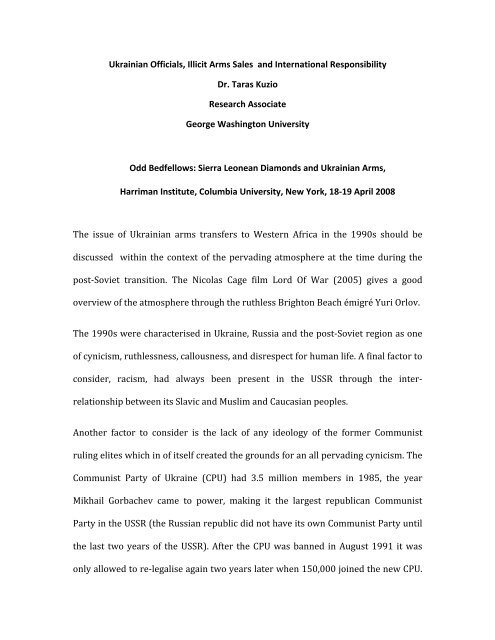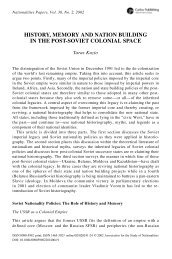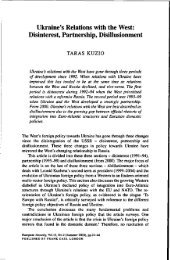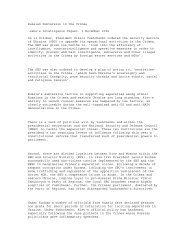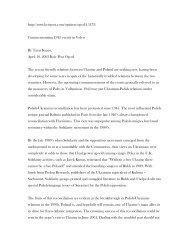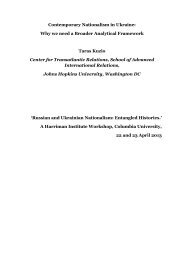Ukrainian Officials, Illicit Arms Sales and International ... - TarasKuzio
Ukrainian Officials, Illicit Arms Sales and International ... - TarasKuzio
Ukrainian Officials, Illicit Arms Sales and International ... - TarasKuzio
Create successful ePaper yourself
Turn your PDF publications into a flip-book with our unique Google optimized e-Paper software.
<strong>Ukrainian</strong> <strong>Officials</strong>, <strong>Illicit</strong> <strong>Arms</strong> <strong>Sales</strong> <strong>and</strong> <strong>International</strong> Responsibility <br />
Dr. Taras Kuzio <br />
Research Associate <br />
George Washington University <br />
<br />
Odd Bedfellows: Sierra Leonean Diamonds <strong>and</strong> <strong>Ukrainian</strong> <strong>Arms</strong>, <br />
Harriman Institute, Columbia University, New York, 18‐19 April 2008 <br />
<br />
The issue of <strong>Ukrainian</strong> arms transfers to Western Africa in the 1990s should be <br />
discussed within the context of the pervading atmosphere at the time during the <br />
post‐Soviet transition. The Nicolas Cage film Lord Of War (2005) gives a good <br />
overview of the atmosphere through the ruthless Brighton Beach émigré Yuri Orlov. <br />
The 1990s were characterised in Ukraine, Russia <strong>and</strong> the post‐Soviet region as one <br />
of cynicism, ruthlessness, callousness, <strong>and</strong> disrespect for human life. A final factor to <br />
consider, racism, had always been present in the USSR through the inter‐<br />
relationship between its Slavic <strong>and</strong> Muslim <strong>and</strong> Caucasian peoples. <br />
Another factor to consider is the lack of any ideology of the former Communist <br />
ruling elites which in of itself created the grounds for an all pervading cynicism. The <br />
Communist Party of Ukraine (CPU) had 3.5 million members in 1985, the year <br />
Mikhail Gorbachev came to power, making it the largest republican Communist <br />
Party in the USSR (the Russian republic did not have its own Communist Party until <br />
the last two years of the USSR). After the CPU was banned in August 1991 it was <br />
only allowed to re‐legalise again two years later when 150,000 joined the new CPU.
2 <br />
The fact that only 5% of the pre‐1991 CPU members re‐joined the new CPU shows <br />
you the degree to which the majority of the Communist Party had ong lost any <br />
ideological convictions <strong>and</strong> had instead joined the party for career <strong>and</strong> <br />
opportunistic reasons. <br />
The 1990s was also conducive to illegal trade because of the socio‐economic <br />
conditions at the time. Ukraine’s economy collapsed by nearly half producing a <br />
greater recession than that experienced in the West in the 1930s. The shadow <br />
economy represented 30‐50% of GDP. There was a blurring of the divisions <br />
between the state, organised crime <strong>and</strong> the newly emerging market economy. The <br />
newly emerging state institutions were corrupted, as was law enforcement. <br />
Needless to say, it would have been impossible for illegal arms transfers on such a <br />
scale without the active involvement <strong>and</strong> connivance of corrupt officials <strong>and</strong> law <br />
enforcement. With elites above the law, privatising the former Soviet state for <br />
personal gain (in what became known as ‘grabization’ rather than privatisation) <br />
there was no state export control in place that could not be circumvented. <br />
In ignoring the frozen conflicts in post‐Soviet states such as the Trans‐Dniester <br />
region of Moldova the West did not assist in blocking illicit arms export. The Trans‐<br />
Dniester region became Europe’s primary black hole for a range of soft security <br />
threats, including arms transfers through the <strong>Ukrainian</strong> port of Odesa. <br />
Western complicity was also evident, <strong>and</strong> continues to be a factor. The proceeds <br />
from illegal trade, whether weapons or raw materials, have to be deposited <br />
somewhere. That ‘somewhere’ is usually in offshore zones controlled by Western
3 <br />
governments (Virgin Isl<strong>and</strong>s), Switzerl<strong>and</strong> <strong>and</strong> new EU member Cyprus. Both <br />
Cyprus <strong>and</strong> the Virgin Isl<strong>and</strong>s continue to be in the top ten foreign investors into <br />
Ukraine. <br />
Western governments also have no unified approach to illicit funds. The same <br />
<strong>Ukrainian</strong> former prime minister (Pavlo Lazarenko) sentenced for money <br />
laundering in the USA would be given the red carpet in Londonski, warned about <br />
drinking tea with strangers <strong>and</strong> then politely asked whether he wished to buy a <br />
premier football club? This year, former <strong>Ukrainian</strong> President Leonid Kuchma’s <br />
daughter purchased a $170, 000 million home in London that broke all records for <br />
British house sales. Lazarenko’s $6 million home in California is merely a pale <br />
reflection. <br />
Western complicity also extended to the use of <strong>Ukrainian</strong> <strong>and</strong> Russian arms <br />
middlemen such as Leonid Minin <strong>and</strong> Viktor Bout. As Charlie Wilsons War (2007) <br />
film showed, the West supplied Soviet weapons to disguise the source of weapons <br />
transfers. Weapons transfers to the Croats, Bosnians <strong>and</strong> Kosovars in their wars <br />
against the Serbs must have had the complicit support of some Western <br />
governments. <br />
The arrest of Minin in Italy in 2000 <strong>and</strong> Bout in Thail<strong>and</strong> in 2008 could be the end <br />
of their careers. The arrest of Bout is undoubtedly linked to that of Semyon <br />
Mogilevich in Moscow in January, a high profile Mafioso wanted by the FBI <strong>and</strong> <br />
sheltered until recently by Russian governments. Mogilevich, Minin <strong>and</strong> Bout were <br />
not only involved in illicit arms transfers but also in high level energy corruption.
4 <br />
Weapons transfers from Ukraine could also take place because of the huge stocks <br />
available at Wallmart prices. Soviet Ukraine was in a first echelon Warsaw Pact <br />
country in the event of war with NATO <strong>and</strong> therefore had huge stocks of weapons. <br />
This was coupled with a Military‐Industrial Complex that covered a third of its GDP. <br />
A Parliamentary Commission headed by army Lieutenant‐General Oleks<strong>and</strong>r <br />
Ihnatenko investigated the arms transfers <strong>and</strong> concluded that of the $89 billion <br />
stocks in 1992, a massive $57 billion had gone missing. Ihnatenko was stripped of <br />
his military rank <strong>and</strong> threatened with court martial for divulging ‘military secrets’. <br />
An inventory of <strong>Ukrainian</strong> arms was not conducted until the last two years of the <br />
Kuchma regime in 2003‐2004; in other words, no inventory had ever been <br />
undertaken in the decade 1992‐2002 when <strong>Ukrainian</strong> officials were heavily <br />
involved in illicit arms transfers to conflict zones like Western Africa. Then Defence <br />
Minister Yevhen Marchuk (see later) concluded that Ukraine had no unified <br />
accounting system <strong>and</strong> had never undertaken an inventory of military equipment. <br />
In the two inventories undertaken in 2003 Marchuk found hundreds of millions of <br />
dollars of weapons stocks missing. Often equipment that had been paid by the West <br />
to be dismantled under the CFE Treaty had been illicitly exported. <br />
Detailed information is difficult to find as transparency was obviously not <br />
something that illicit arms dealers were interested in. Individuals who know too <br />
much have been routinely disposed of. The head of the state <strong>Ukrainian</strong> arms export <br />
agency Valeriy Malyev died in one of many suspicious car accidents as an arms <br />
transfer sc<strong>and</strong>al unfolded.
5 <br />
Some information became available on the Mykola Melnychenko tapes made in the <br />
Presidents office in the late 1990s. Melnychenko was a member of the presidential <br />
guard (the <strong>Ukrainian</strong> Secret Service) <strong>and</strong> was given asylum in the US in 2001. <br />
The Melnychenko tapes provide evidence of some illicit transfers but they only <br />
cover the 1999‐2000 period. They provide information on Ukraine illegally breaking <br />
UN sanctions in delivering military radars to Iraq in 2000. The Melnychenko tapes <br />
have yet to be fully studied because even the post‐Orange Revolution authorities do <br />
not wish to open up a p<strong>and</strong>ora’s box especially when the President <strong>and</strong> his close <br />
associates faithfully served Kuchma for seven of his ten years in office. They could <br />
provide greater evidence of illicit arms transfers <strong>and</strong> high level abuse of office in the <br />
1990s. <br />
The Melnychenko tapes are inter‐linked to divisions in Ukraine’s elites. To what <br />
degree these are quarrels over the morality of arms transfers to war torn regions or <br />
whether the divisions are more to do with divisions of the spoils is difficult to know. <br />
The Melnychenko tapes st<strong>and</strong> in the epicentre of a clash between the former <br />
(Yevhen Marchuk) <strong>and</strong> then (Leonid Derkach) chairman of the Security Service <br />
(SBU). Marchuk accused Derkach publicly of being directly involved in illicit arms <br />
sales. Derkach was removed as SBU chairman in February 2001 but he has never <br />
faced any criminal charges. <br />
During the 1990s <strong>Ukrainian</strong>s arms unofficially ended up in the Balkans, although <br />
some shipments organised by Minin <strong>and</strong> his accomplice Strashynsky were <br />
impounded. Ukraine’s relations wit the US <strong>and</strong> NATO deteriorated after it continued
6 <br />
to send weapons to Macedonia despite personal assurances given by Kuchma to US <br />
Secretary of State Condoleezza Rice. To Africa, <strong>Ukrainian</strong> arms ended up in Liberia, <br />
Sierra Leone, Ivory Coast (for onward shipment to Liberia <strong>and</strong> Sierra Leone), <br />
Angola, Rw<strong>and</strong>a, Eritrea <strong>and</strong> Zaire‐Democratic Republic of Congo. In the greater <br />
Middle East <strong>Ukrainian</strong> arms were exported to Iraq, Iran, <strong>and</strong> South Yemen. In Latin <br />
America <strong>Ukrainian</strong> arms ended up in Peru. In Asia, they were exported to Sri Lanka, <br />
Burma (despite an international embargo in place), China <strong>and</strong> Pakistan. In the latter <br />
case, some weapons could have been sent to Taliban‐ruled Afghanistan at a time in <br />
the 1990s when the Pakistani authorities supported the Taliban regime. <br />
In conclusion, <strong>Ukrainian</strong> illicit arms sales to Western Africa <strong>and</strong> elsewhere occurred <br />
at a time of transition anarchy in Ukraine after the disintegration of the USSR. This <br />
does not excuse <strong>Ukrainian</strong> officials from complicity as arms trade could not have <br />
been undertaken without the active involvement of senior officials reaching as high <br />
as the President. The same callousness <strong>and</strong> cynicism that these officials displayed <br />
towards their own populations during the 1990s was exported through arms <br />
transfers to conflict zones around the world. In the same way that Yuriy Orlov was <br />
unperturbed by the suffering brought by his arms transfers to Africa so too were <br />
President Kuchma <strong>and</strong> his oligarchs unperturbed by the suffering they brought <br />
down on <strong>Ukrainian</strong>s. During his decade in office the <strong>Ukrainian</strong> population declined <br />
by 5 million <strong>and</strong> life expectancy fell. <br />
What is more surprising is the continued callous disregard on the question of illicit <br />
arms transfers exhibited by Ukraine’s Orange Revolution leaders. Ukraine’s
7 <br />
diplomats, including those in residence as Visiting Scholars in Columbia, refused to <br />
participate in the conference drawing on Soviet era formulations that conferences of <br />
this type merely serve to denigrate Ukraine’s international reputation. Until <br />
Ukraine’s diplomats realise the opposite; namely, that a reconciliation with history <br />
is good for a country’s reputation as it draws a line between the former bad regime <br />
<strong>and</strong> the good new regime. <br />
No country can move on if it fails to deal with the skeletons in its closet, especially <br />
when a country’s weapons have brought untold misery on the peoples of Western <br />
Africa. President Yushchenko’s failure to realise that hiding his head in the s<strong>and</strong> <br />
about the Kuchma era (as he has on every issue from the Gongadze murder to arms <br />
sales) has served to hurt him politically <strong>and</strong> will cost him his second term. <br />
<br />
<br />
<br />


